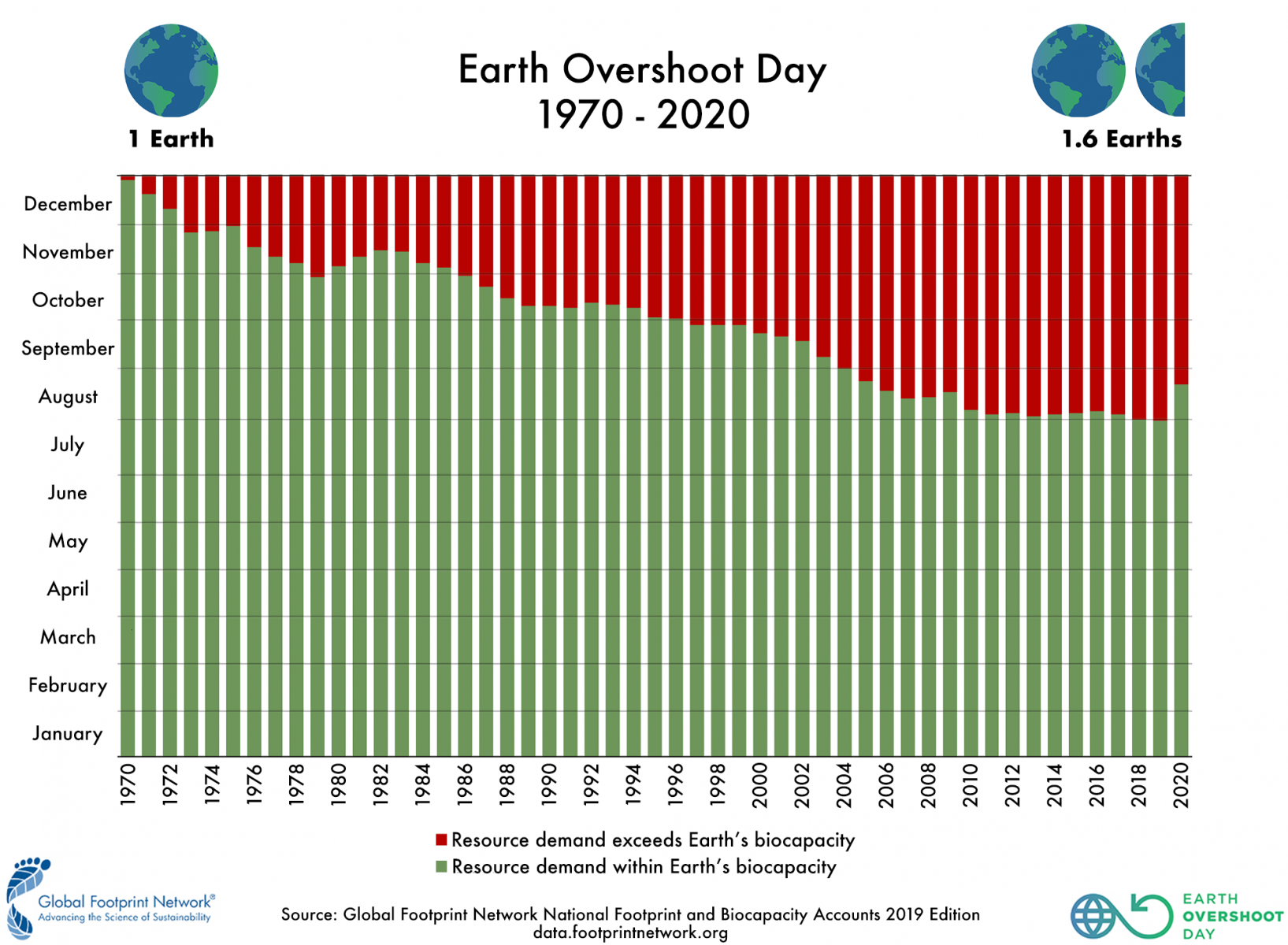
Cycling delayed Earth Overshoot Day 2020
By August 22, humans will have demanded as much from nature as Earth can renew in the whole year. This Earth Overshoot Day arrives more than three weeks later this year than in 2019. The great reduction of humanity’s ecological footprint is closely related to the reduced use of the private car during coronavirus-induced lockdowns. Cycling has played a major role in this historic shift in the long-term growth of humanity's Ecological Footprint.
Earth Overshoot Day is here. From August 22nd, humanity's resource consumption for 2020 will exceed Earth’s capacity to regenerate those resources this year. This is an overwhelming fact, but seen from a different perspective it can hold some hope. The 2020 date reflects a 9.3% reduction of humanity’s ecological footprint from January 1st to Earth Overshoot Day compared to the same period last year. This shift in the year-to-year date represents the greatest ever single-year shift since the beginning of global overshoot in the early 1970s.
To estimate the date of Earth Overshoot Day for each year, the international research organization Global Footprint Network calculates the number of days of that year that Earth’s biocapacity can provide for humanity’s Ecological Footprint. (Earth’s Biocapacity / Humanity’s Ecological Footprint) x 365 = Earth Overshoot Day.
 Moving to a carbon-free world
Moving to a carbon-free world
COVID-19 has caused humanity's Ecological Footprint to contract this year: forest exploitation and carbon emissions have dropped sharply during lockdowns. The Carbon Footprint alone has been reduced by 14.5% from 2019! Considering that personal mobility represents 17% of humanity's carbon footprint, it can be assumed that reduced use of the private car moved the date of Earth Overshoot Day.
During the coronavirus crisis, policymakers all around the world increased efforts to promote cycling as an alternative to private cars and overcrowded public transport. In Europe alone, ECF has tracked more than 2315 km of new cycle-friendly streets and more than 1 billion euro extra funding for cycling in response to the Coronavirus crisis. The result has been more breathable, livable and healthy cities. And citizens realize that they do not want to return to the toxic and noisy old ‘normal’. But looking at the carbon footprint data, the impact of this “cycling boom” has been much greater than anticipated. The bicycle has become an essential tool to build a future in harmony with our finite planet.
Start cycling, start moving back Earth Overshoot Day
If we reduce our Footprint from driving by 50% around the world and assume one-third of car miles are replaced by public transportation, biking and walking, Earth Overshoot Day would move back 13 days. Cycling has been one of the drivers of this historic shift in the long-term growth of humanity's Ecological Footprint in 2020, but to maintain this positive change there must be a real long-term commitment from all institutions.
We must seize this great cycling “momentum”, boosted by the pandemic crisis, to ensure that car-free measures are here to stay - and not just as a temporary event. This mobility planning shift cannot just be a municipal responsibility, cycling is essential for the sustainable recovery of the European Union beyond this crisis. The EU institutions need to fairly distribute investments in the transport sector and continue to push for more cycling projects.
We managed to reduce our negative impact on the earth this year, but humanity as a whole is still using nature 1.6 times faster than our planet’s ecosystems can regenerate. Moving the date of Earth Overshoot Day back 5 days each year would allow humanity to reach one-planet compatibility before 2050.
The first step to achieve this is to commute carbon-free: start cycling!

Regions:
Contact the author
Recent news!
Upcoming events
Contact Us
Avenue des Arts, 7-8
Postal address: Rue de la Charité, 22
1210 Brussels, Belgium









